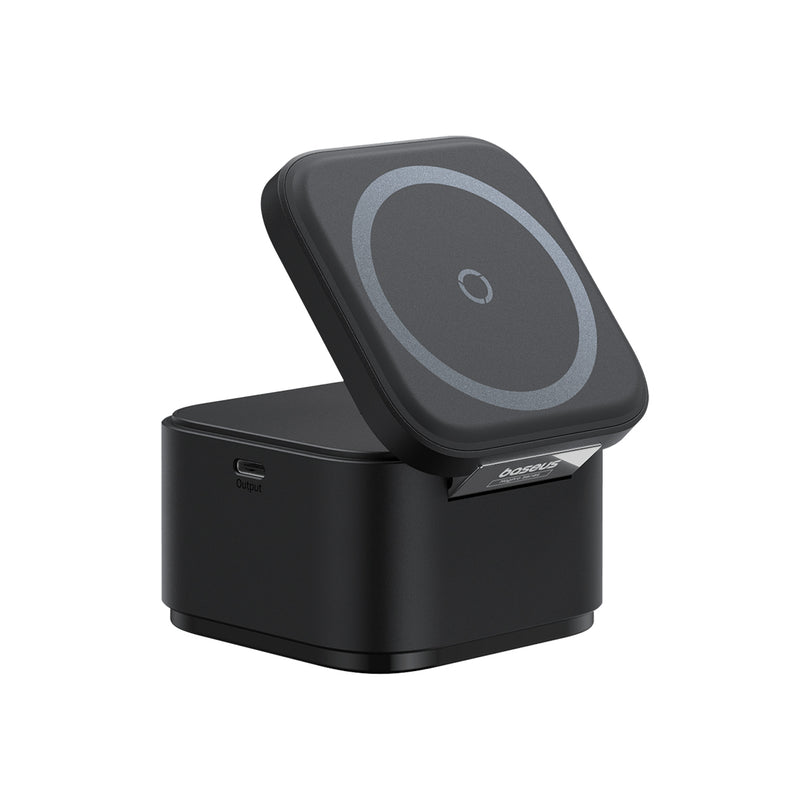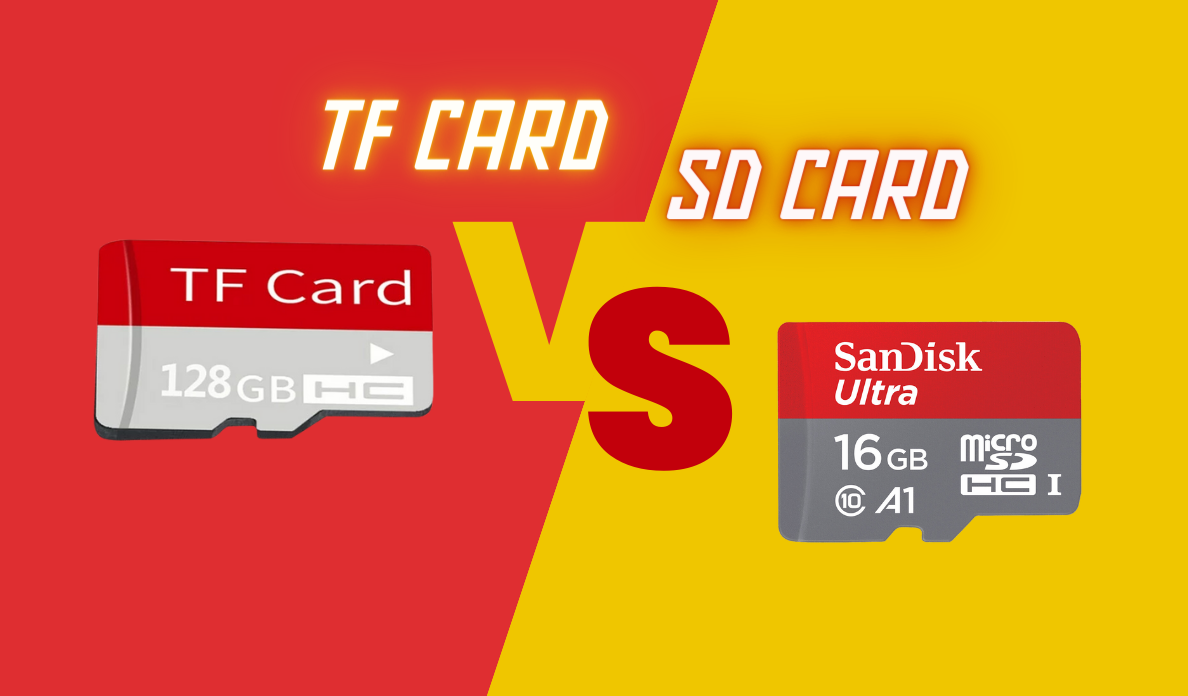Thriving in Serenity: How to Survive Living Off the Grid
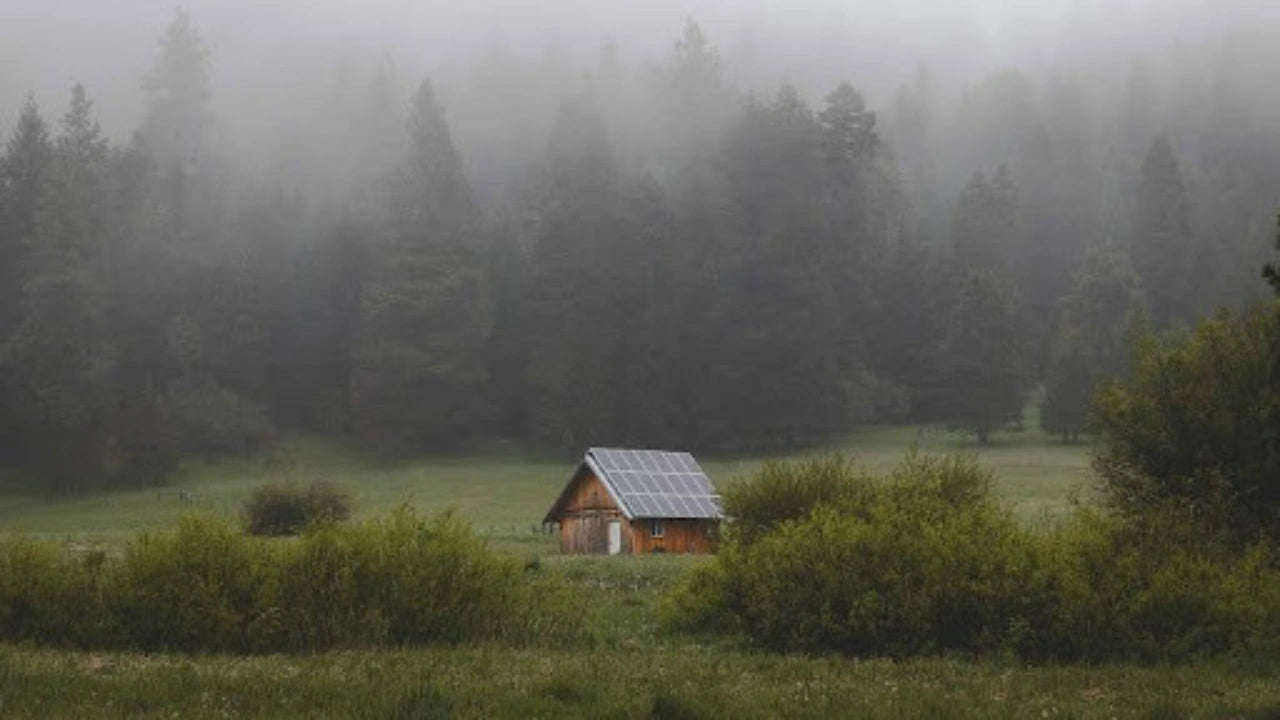
In the collective imagination, off-grid living often conjures up images of rugged survivalists in remote deserts or serene individuals seeking refuge from city life, nestled in snowy forests where the only soundtrack is nature's chorus.
What does living off the grid mean? The answer is as diverse as the landscapes of the land itself. It ranges from quaint tiny homes hidden in woodland clearings to innovative shipping container residences perched by the ocean and even extends to urban settings where individuals carve out self-sufficient niches.
At the heart of these varied lifestyles lies a common thread: a deliberate disconnection from the conventional grid. This independence means no reliance on mainstream power sources, no tether to municipal water supplies, and a step away from wired communication networks.
Embracing this lifestyle isn't just about where you live; it's about redefining how you live, especially when it comes to powering your day-to-day life.
How to Live Off the Grid: Key Considerations for Your Off-Grid Haven

Embarking on an off-grid adventure is a complete lifestyle transformation that requires thorough preparation and thoughtful consideration.
The allure of self-sufficiency and harmony with nature is strong, but to make this dream a reality, you must plan meticulously.
Selecting the ideal spot for your off-grid living adventure involves understanding and adapting to the local environment. Here’s an expanded look at the crucial factors:
What’s the Best Climate?
The local climate profoundly impacts your daily life and the design of your home. If you're drawn to colder regions, consider the challenges of heating and access during snowy seasons.
In contrast, warmer climates demand strategies for cooling and water conservation. Assess how the weather patterns align with your lifestyle - do you prefer a lush green landscape that requires more rainfall, or are you comfortable in arid, sunnier environments?
Finding Good Water Sources
Water is the lifeblood of off-grid living. If you're near natural water sources like rivers or lakes, research the legalities and practicalities of using this water. In areas without direct water access, consider the potential for rainwater collection and storage systems.
These systems can be simple barrels for garden watering or more complex setups for household use. Remember, the availability and reliability of water sources will significantly influence your daily life and the feasibility of agriculture or livestock keeping.
Powering and Connecting Your Off-Grid Life
In an off-grid setting, managing energy and staying connected is crucial for a comfortable and safe lifestyle. Here's an expanded look at these essential aspects:
Power Needs: Estimating your energy requirements is fundamental. Start by listing all the appliances and devices you'll use, from the fridge to lights, and don't forget special needs like medical devices. Common power generation methods include:
- Solar Panels: Great for sunny areas but depend on weather conditions.
- Wind Turbines: Effective in windy locales but can be inconsistent.
- Hydro Power: A steady source if you're near flowing water.
- Gasifiers: Convert biomass into usable gas, useful in wooded areas.
Power Storage and Conversion: Storing and converting energy is as important as generating it. You’ll need a system of batteries for storage, often 12/24V, along with inverters and rectifiers to convert power to usable forms.
Portable Power Solutions: There will be times when the sun doesn’t shine, the rain doesn’t fall, and the wind doesn’t blow. In such instances, having a portable power solution is vital. It ensures that critical devices like medical equipment, phones, and lights stay operational.
Portable power units such as the Baseus portable power station are also incredibly handy for carrying energy across your property - imagine needing to use a power tool or recharge a laptop in a remote spot far from your main power source.
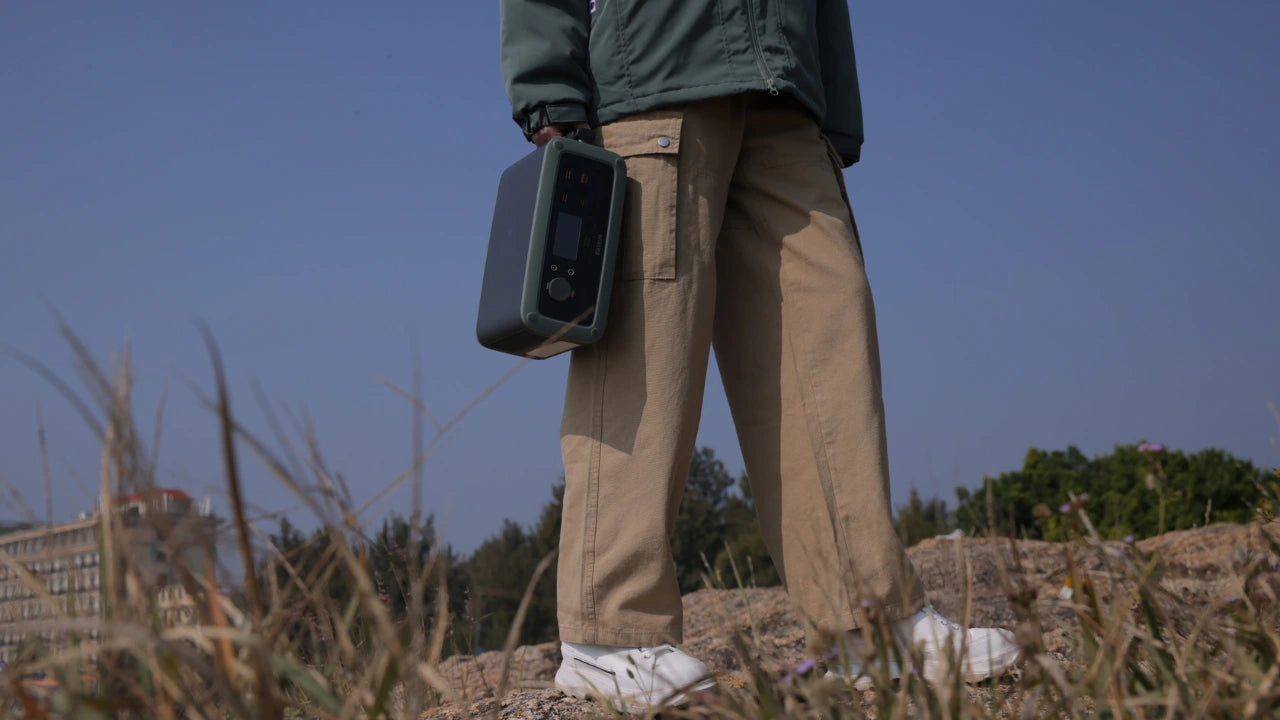
A Baseus IOTA power station can support multiple devices and comes in a convenient 140W (48,000mAh battery) and a powerful 420W (90,000mAh battery) design.
The features of a Baseus portable station unit include:
- Both AC and DC Outlets: For versatility in powering different types of devices.
- Fast Recharging Capability: To quickly harness power when available.
- Multiple Charging Options: Including mains electricity, solar panels, or even your car.
- User-Friendly Interface: A screen displaying power levels, temperature, overload warnings, and more.
- Lithium Iron Phosphate Battery: Seamless delivery of power right until the end. Important for sensitive devices like CPAP machines.
- Built-In LED Light: Emergency and Instant Lighting
- App Monitoring: Real-time settings and monitoring of critical components
By carefully planning your energy and communication strategies, you can ensure your off-grid life is both sustainable and connected, meeting all your modern needs without compromising on your off-grid ideals.
Connectivity and Communications
In an off-grid setting, maintaining digital connectivity is not just a luxury; it's often a necessity. Whether it's for remote work, emergency communications, or staying in touch with loved ones, the right setup can ensure you're never too far from the rest of the world. Here’s an in-depth look at the options and considerations:
Satellite Internet Services: Services like Starlink are revolutionizing off-grid internet access. They offer high-speed internet in even the most remote locations, ensuring reliable connectivity for work and communication. The key is clear sky visibility for the satellite dish, so consider the placement to avoid obstructions like trees or mountains.
Mobile Internet: Depending on the cellular coverage in your area, mobile internet can be a viable option. It's essential to research the available networks and their signal strength in your intended location. Remember, proximity to cell towers and the terrain can significantly impact the quality of your mobile internet.
Radio Communication: For those in extremely remote areas or as a backup for emergencies, radio communication (like amateur radio) can be invaluable. It requires some technical know-how and licensing but offers a reliable means of communication when other methods fail.
Antenna Placement and Types:
- Yagi Antennas: Directional antennas like Yagi are excellent for long-distance communication, especially if you have a clear line of sight to a transmission tower. They're more focused and can reach farther but require precise alignment.
- Omni-Directional Antennas: These are more versatile as they can receive signals from all directions. While they don’t have the range of Yagi antennas, they are a good choice if you are in an area with multiple signal sources.
Site Signal Testing: Before settling on your off-grid location, it’s wise to perform a signal survey. Check for potential obstructions caused by natural features like mountains or valleys and understand how they might affect your connectivity.
Testing helps ensure that you choose a site with the best possible access to communication networks.
In an off-grid setting, your connectivity solutions must be as robust and self-reliant as your other living systems. By carefully considering your options and planning your setup, you can achieve a balance of seclusion and connection, ensuring that you’re part of the world, no matter how far off the beaten path you are.
Self-Sufficiency Level: Tailoring Your Off-Grid Lifestyle

The degree of self-sufficiency you aim for in off-grid living deeply influences your daily routines and long-term planning. Here's a closer look at key aspects to consider:
Food Production
Growing your own food and raising livestock are quintessential elements of off-grid living. Think about what you'd like to grow and the types of animals you might want to raise.
Vegetable gardens, fruit orchards, and small-scale livestock like chickens or goats can significantly enhance your self-reliance. However, these require different levels of commitment, knowledge, and resources. Investigate what crops and animals are best suited to your climate and land.
Remember, sustainable practices like composting and water conservation become integral parts of your food production strategy.
Land Requirements
The size and type of land you choose should align with your self-sufficiency goals. For extensive food production or larger livestock, more land may be necessary. However, innovative techniques like vertical gardening or aquaponics can maximize food production in smaller spaces.
Assess the soil quality, topography, and existing vegetation of potential land. These factors not only determine what you can grow but also influence how you'll manage water runoff, wind exposure, and sun access.
Even if large-scale farming isn't your goal, consider how much space you'll need for your home, outbuildings, and any recreational areas.
When deciding on your self-sufficiency level, balance your aspirations with practical considerations. It's essential to realistically assess your skills, the time you can commit, and the resources at your disposal.
Navigating Legalities and Logistics of Off-Grid Living
While off-grid living is legally permissible across the United States, the ease and feasibility of this lifestyle vary significantly from state to state. Understanding local regulations, building codes, and land classifications is crucial before embarking on your off-grid journey.
Here's a closer look at the landscape:
What States Allow Off-Grid Living
- Vermont: Known for its beautiful landscapes and a climate conducive to off-grid living. Vermont's relaxed building and zoning laws make it an attractive option.
- Oregon: Boasts a large community of off-grid dwellers, offering a supportive environment and resources for newcomers.
- Alaska: While the climate poses challenges, Alaska offers legal support and even encouragement for off-grid living.
- Alabama: Features favorable laws for farming and homesteading, making it a great choice for those looking to be self-sufficient.
- Florida and Texas: Both states are known for their relaxed laws regarding off-grid living, offering more flexibility in how you set up your homestead.
What States Make it Challenging for Off-Grid Living:
- Connecticut: High costs and strict building laws make off-grid living more challenging.
- New Jersey: The high population density coupled with stringent zoning laws can be prohibitive.
- Hawaii: Unique in its requirement that all homes must be connected to the electrical grid.
Understanding Local Laws
It's essential to research the specific laws in your chosen state, as they can vary widely. This includes regulations on building materials, sewage disposal, and land use.
It also pays to be aware of the tax implications of your land and property. These taxes can vary significantly and impact your long-term financial planning.
While off-grid living is a viable option across the United States, the level of ease and support varies. Thorough research and understanding of state-specific laws are key to a successful transition to this independent lifestyle.
Embracing Off-Grid Living: Power Your Independence with Baseus
Off-grid living offers a unique blend of freedom, self-reliance, and harmony with nature. From choosing the perfect location and building a sustainable home to ensuring reliable power and connectivity - every aspect of this lifestyle is about thoughtful preparation and embracing independence.
If you decide to embark on this exciting journey, remember that reliable power is the heartbeat of off-grid living.
Baseus portable power solutions are designed to keep your life running smoothly, even when traditional power sources are out of reach.
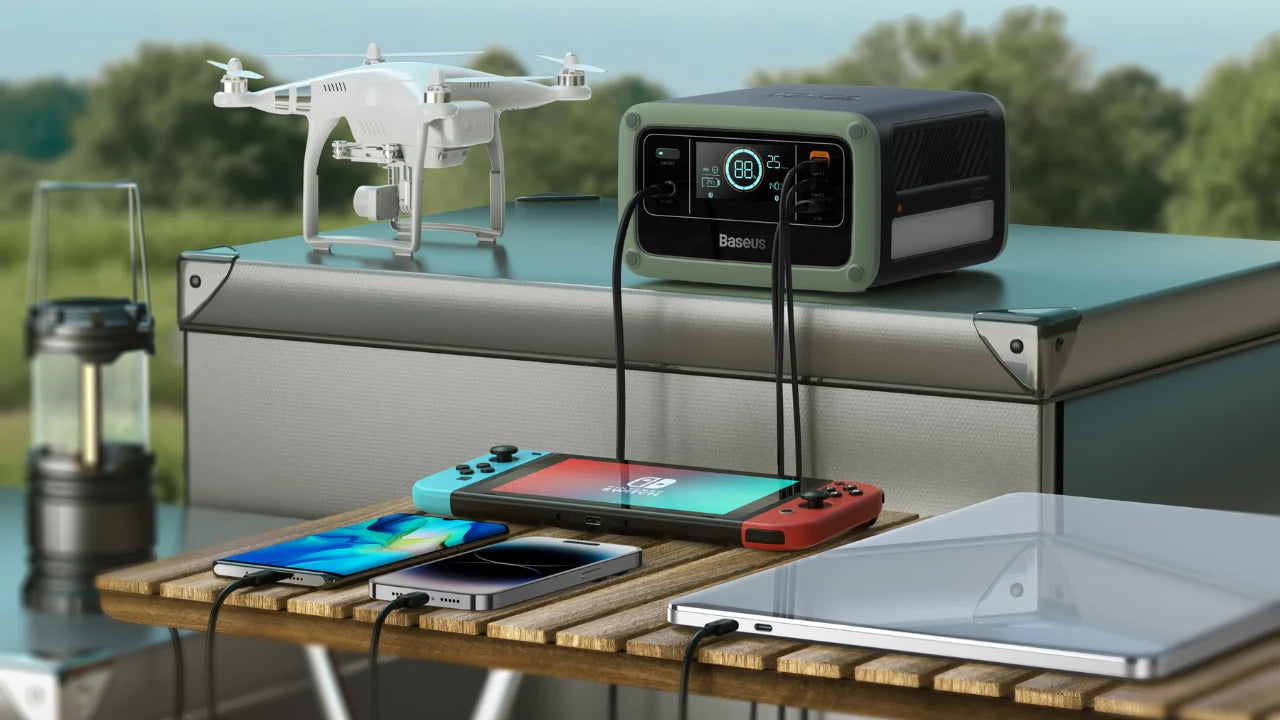
With versatile features like AC and DC outlets, fast recharging, and user-friendly interfaces, Baseus products ensure that your essential devices are always powered, no matter where your off-grid adventure takes you.
For more insights into powering your off-grid lifestyle and to explore our range of products, visit our blog and discover how Baseus can be an integral part of your journey towards a sustainable, self-sufficient life.
Step into the world of off-grid living with confidence, knowing that Baseus is here to power up your path to freedom.
 United States/English
United States/English





